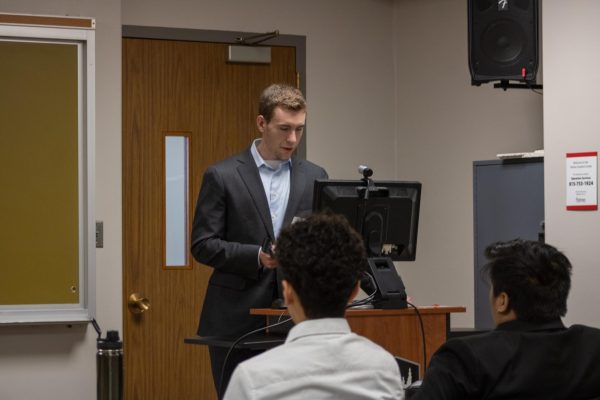Anthropology professor receives grant
May 5, 2003
Gary Schwartz, an anthropology professor, recently won a grant from the National Science Foundation worth $307,000.
“The grant will be used to study the rules that govern how animals grow up, or their so-called life history,” Schwartz said. “This is a fundamental aspect of an animal’s biology and a very difficult thing to examine in long-dead fossils, but new tools are allowing us to accurately reconstruct the important biological parameter with unparalleled precision.”
Schwartz attended New York’s Stony Brook University with initial intentions of studying physics and astronomy, but he said anthropology found him.
“I have always been fascinated with natural history, at one level or another,” Schwartz said.
“My earliest memories are begging my parents to drive me into the American Museum of Natural History on a Saturday, so that I could go see all the wonderful dinosaur and mammal fossils. I always knew I would end up studying the history of our planet, whether it was from the perspective of an astronomer, or that of a paleontologist.”
Although Schwartz has been teaching at NIU since the beginning of August, a variety of other schools has given him experience in his field.
Schwartz was accepted to do his master’s and then his Ph.D. at Washington University in St. Louis. Before finishing, however, he went to South Africa where he taught anatomy at Witwatersrand Medical School in Johannesburg, South Africa.
He then was granted a post-doctoral research position at University College London. After that, he took up a second post-doc position at the Smithsonian Institution’s Natural History Museum in D.C.
“NIU has generously supported my research since my first arriving here last autumn,” Schwartz said. “It has taken a year, but my lab is finally up and running enabling me to begin my research in earnest.”
Schwartz feels fortunate to work at the anthropology department at NIU because of the recognized master’s program.
“It is important for these students to learn the ropes insofar as getting one’s hands dirty in the lab,” Schwartz said. “Students learn the most by actually doing it, and this is just the kind of research that will introduce the uninitiated to the process of scientific discovery.”
Schwartz believes that anthropology gives students a more physical appeal to learning.
“More than any other subject, biological anthropology is a touchy-feely science; students have to hold, fondle, palpate, examine, etc.,” Schwartz said. “The direct evidence on which human evolutionary scenarios are based. It is astounding to see the light bulb turn on in students when they are able to hold in their hands the entire cast of characters in the story of human evolution.”













